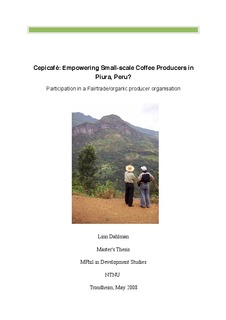| dc.description.abstract | This thesis looks at Cepicafé, a Fairtrade/organic coffee producer organisation in Piura, Peru. It discusses the contributions made to empowerment of the members, and identifies some of the obstacles to participation and empowerment, both within the organisation and outside.
Small-scale coffee producers often find themselves in a vulnerable and disempowered position in relation to the world market. The Fairtrade and organic market initiatives focus on improving trade relations and demanding social, economic and environmental standards in production. They only work with organised producers, hence my subject for the analysis is a producer organisation. Cepicafé's aim is sustainable development, improving quality of life and eradication poverty among small-scale producers in Piura. This will involve a process of empowerment, as poverty is also considered to be powerlessness and voicelessness.
The theoretical, conceptual and analytical foundation for this thesis is concerned with empowerment through participation and collective action. Empowerment is seen to be a process which involves enabling social, political and psychological power. Power is considered to be a fluid concept and actors are seen to hold varying degrees of these powers, relative to the time, place and relations they find themselves in. The ultimate goal is collective empowerment. This involves participation aimed at achieving radical change in the producers' circumstances. Hence, there is a need to include political claims and confront forces outside of the organisation. Cepicafé's role in a multi-levelled, global/local network presents a great potential for this.
The empirical data aims at showing the research participants' multiple realities. Knowledge is produced through interviews, observation and informal conversations with coffee producers and staff in Cepicafé during a two months long field work in Piura, Peru in 2007.
The analysis looks at firstly the services provided by Cepicafé as a way of strengthening social power. Commercialisation, credit support, and technical assistance and knowledge transfers are the main functional areas through with support is given. However, as the producers in the organisation are a heterogeneous group with reference to agency and socio-economic status, both perceived and actual benefits vary. Second, information flows and knowledge transfers related to decision-making as well as the fluidity of power relations amongst actors is put under scrutiny in order to understand the producers' access to participation and political power, which is an important step towards empowerment. The mentioned heterogeneity, a lack of understanding of issues related to Fairtrade and the market, as well as existing power relations between the actors at the local level are seen to affect the ability to participate in decisionmaking. The organisation seems also to mainly focus on service provision, and does not really engage in political advocacy. There is a need to consolidate the efforts among the different levels in the multi-levelled network that Cepicafé is a part of, in order to also include the producers in this struggle. | nb_NO |
